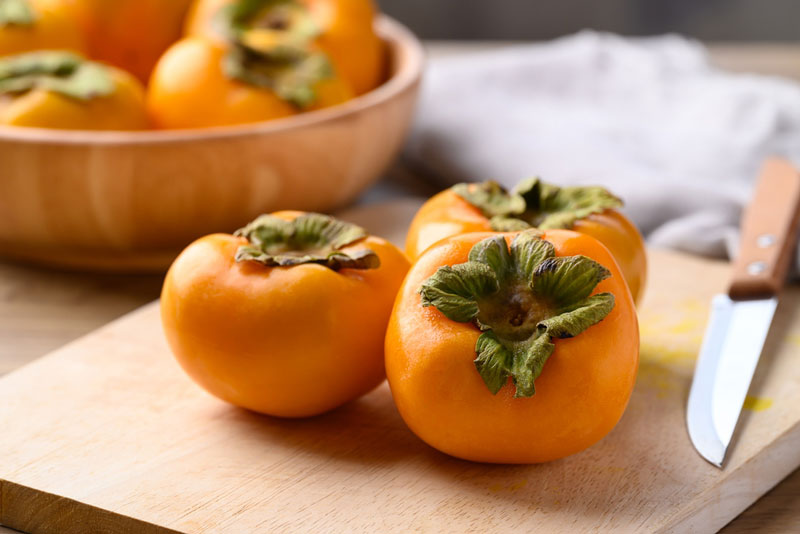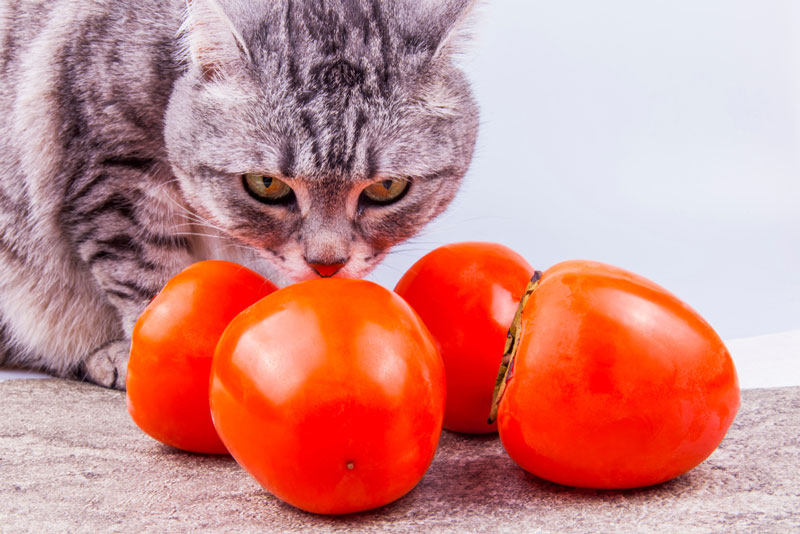Have you ever wondered if our furry feline friends can munch on persimmons? The answer is a bit surprising! Cats can technically eat persimmons, but it is not recommended. While persimmons are not toxic to cats, they don’t really provide a vital source of nutrition for them. So, if you’re thinking about sharing this sweet fruit with your kitty, you might want to reconsider.
Persimmons are packed with vitamins and nutrients that are great for humans, but cats have different dietary needs. Cats are obligate carnivores, which means their bodies are designed to thrive on meat. Fruits like persimmons are not part of their natural diet, and they might not digest them well. Sharing human foods can sometimes lead to the infamous “cat bellyache” or worse! So let’s keep those persimmons for ourselves.
Curious to learn more about the dos and don’ts of feeding your cat? Keep reading! We’ll dive deeper into the topic of persimmons, their benefits, potential risks, and what you can offer your pet instead. Let’s ensure that our eight-legged companions stay safe and healthy!
You might also be interested in: Can Cats Eat Peach?
Can Cats Eat Persimmons?

Cats can occasionally nibble on persimmons, and they may enjoy the sweet taste. However, it is crucial to remember that their digestive systems are not built like ours. While persimmons are not poisonous to cats, eating them can lead to some stomach issues, especially if consumed in large quantities. The sap from the fruit and the seeds can pose more significant issues since they can be difficult for a cat’s stomach to process. This can lead to discomfort, and no one wants a grumpy cat!
Additionally, many fruits, including persimmons, contain sugar. Our feline friends require only a small amount of carbohydrates in their diet, making the sugary content of persimmons unnecessary. If your cat has eaten a piece of persimmon without looking too sick afterwards, it may not always be an immediate cause for worry. However, it’s best to consult with a veterinarian to ensure your cat is safe. Always keep in mind that the cat food industry has created diets specifically catered to cats, so it is wise to stick with those to meet their nutrient needs.
How Much Persimmons Can Cats Eat?
When asking how much persimmon is safe for our furry friends, the best answer is none! The truth is that persimmons, while tasty for some, shouldn’t be part of your cat’s regular diet. These fruits may cause gastrointestinal discomfort and nausea if consumed in significant amounts. If you feel that your cat’s diet needs extra nutrients or something different, it’s a good idea to consult a vet before adding anything new.
In case you want to treat your kitty, moderation is key! If your pet snags a small piece of persimmon occasionally, it is probably not going to harm them. However, keep a close watch for any signs of distress. An upset stomach or allergies should send you running to the vet.
Moreover, providing safer alternatives as treats is a better choice. If you want to offer your cat the excitement of a new taste, opt for something that is feline-friendly, such as small bits of cooked chicken or certain vegetables. Always monitor your cat’s reaction to new foods, ensuring that their health comes first in every dietary decision.
While persimmons may seem like a fun treat, let’s be clear – feeding your cat a whole persimmon is a big no-no. Keeping our pets healthy involves knowing which human foods can or cannot be shared, and there are countless other cat-friendly options that can make our feline companions just as happy.
So remember, if you’re ever tempted to share a slice of your persimmon, it’s best to keep it to yourself for now. After all, a happy cat is a healthy cat!
Benefits Of Persimmons To Cats
1. Vitamins and Fiber: If your cat happens to eat a little bit of persimmon, it could provide them with some vitamins and fiber. Persimmons are a good source of Vitamin C, which is essential for a healthy immune system. However, it’s packed with sugar that cats do not require in their diet.
2. Antioxidants: The fruit is also rich in antioxidants. While cats do need antioxidants, they are best received through a well-balanced diet designed specifically for cats. Therefore, even though persimmons have health perks for humans, these bonuses do not translate into benefits for our feline pals.
3. Temporary Treat: Eating a tiny bit of persimmon may provide a temporary treat and some entertainment for your kitty, drawing them away from boredom. Cats often appreciate new sensory experiences! However, there are other ways to enrich their environment without risking their health.
4. Bond Between Us and Our Kittens: Sometimes those adorable faces want to join in on our snack time! It’s charming to see their excitement for food and brings a bond between us and our kittens. Sharing moments like feeding time can create fun memories without requiring risky food like persimmons.
5. Encourages Research Among Cat Owners: Engaging in feeding them small bits of fruits like persimmons could be a way to encourage us as responsible cat owners to research and learn about their dietary needs. Finding information prompts us to dig deeper and provide healthier options. Perhaps we will discover veggies or treats they can snack on that will be safe and nutritious!
Dangers Of Feeding Persimmons To Cats
While persimmons are not toxic to cats, there are several risks to consider. One major concern is their sugar content. Cats have a different metabolism and cannot process large amounts of sugar, leading to obesity and other health conditions. If your cat occasionally snitches on a piece, they may react just fine, but overindulging can seriously risk weight gain.
Further, the seeds of persimmons are also a potentially dangerous factor. They can cause intestinal blockages, which can be quite serious. If your curious kitty gobbles down more than one or two seeds, they may develop an upset stomach, which may require a vet’s assistance.
Remember that cats are masters in hiding their discomfort. They may not show immediate signs of trouble, but monitoring is crucial. Observe their eating habits, litter box visits, and overall behavior. Any significant changes should be discussed with your veterinarian to avoid ignorance of potential dangers.
Another important point is the risk of developing allergies. Some cats have sensitive stomachs and might react differently to even small bits of unusual foods like fruits. The intake of persimmons could lead to vomiting or diarrhea in some cases, so keeping the amount at a minimum is key!
Lastly, our responsibility as cat owners is to limit exposure to risky human foods. Always consult your veterinarian before experimenting with introducing new items into your pet’s diet. Want to keep it simple? Stick to the established cat food brands that provide all the essential nutrients they require without the added risks.
Substitute Of Persimmons For Cats
1. Cooked Chicken or Turkey: Instead of thinking about doing a fruit roll with persimmons, consider introducing cooked chicken or turkey. These are protein-rich choices packed with the nutrients our cats need!
2. Vegetables: like cooked carrots or peas can be a healthy alternative too. A small amount can act as a delightful complement to their regular diet without risk of upsetting their stomach.
3. Commercial Treats: There are also commercial treats specifically designed for cats that are high in protein and low in sugar. Look for options that contain fish or chicken flavors because you can bet your kitty will be delighted!
4. Melon or Watermelon: If you want your cats to enjoy some sweetness, opt for slices of melon or watermelon. Keeping a keen eye for seeds is important, but these fruits offer hydration and are less risky compared to persimmons.
5. Veterinarian-recommended Diets: As an overall habit, sticking with veterinarian-recommended diets is a solid practice but know that you surely can supplement their meals with safe, healthy snacks as well! Explore food for your pet that’s designed explicitly for them, ensuring they are getting all of the goodness without the fruit fiasco.
Can Cats Eat Persimmons? Frequently Asked Questions
What Should I Do If My Cat Eats Persimmons?
If you suspect that your cat has eaten persimmons, watch for any symptoms of distress, such as vomiting or diarrhea. If the symptoms persist, consult your veterinarian for advice and assistance.
Can Kittens Eat Persimmons?
Young kittens have even more delicate stomachs than adult cats. It is best to hold off on offering any fruit to kittens as their primary dietary needs revolve around animal protein and proper kitten food.
What Fruits Can Cats Eat Safely?
Some safe fruits for cats include small amounts of bananas, blueberries, and strawberries. Always remember to serve them in moderation, ensuring to avoid any seeds or harmful parts of the fruit.
Can Cats Eat Other Human Foods?
Yes, some human foods can be safe for cats, such as plain cooked meats, certain vegetables, and some dairy products in moderation. Always check with your vet before introducing new items.
What If I’m Unsure About What To Feed My Cat?
Chat with your veterinarian about your cat’s diet and preferences. They can guide you on the best foods and treats to incorporate, ensuring your cat remains healthy and happy!
Final Thoughts
We all want the best for our pets, and keeping them healthy means being cautious about what we share with them. While persimmons are tasty for us, they hold risks for our cats. Instead of biting into that persimmon slice and offering it to Mr. Whiskers, let’s explore more suitable alternatives that match their dietary needs.
We’re all learning together in this pet-parenting adventure. If you’re curious about other fruits, you might be asking yourself Can Cats Eat Mango? Let’s keep our precious pets safe and informed!


